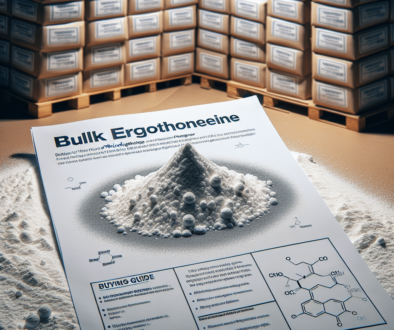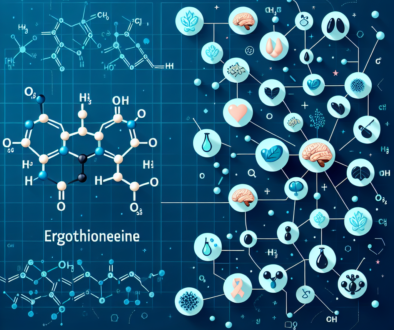Ergothioneine Synthesis: Decoding EgtD Inhibition
-
Table of Contents
- Ergothioneine Synthesis: Exploring EgtD Inhibition Strategies
- The Significance of Ergothioneine
- Understanding Ergothioneine Biosynthesis
- The Role of EgtD in Ergothioneine Synthesis
- Decoding EgtD Inhibition
- Strategies for Inhibiting EgtD
- Case Studies and Research on EgtD Inhibition
- Implications of EgtD Inhibition
- Challenges and Future Directions
- Conclusion: Key Takeaways on EgtD Inhibition
- Discover ETprotein’s High-Quality Protein Products
Ergothioneine Synthesis: Exploring EgtD Inhibition Strategies

Ergothioneine (ET) is a naturally occurring amino acid derivative that has garnered significant attention due to its potential as an antioxidant and cytoprotective agent. The biosynthesis of ergothioneine is a complex process involving several enzymes, with EgtD being a critical component. Understanding and inhibiting EgtD can have profound implications for the field of biotechnology and medicine. This article delves into the intricacies of ergothioneine synthesis, the role of EgtD, and the potential benefits of its inhibition.
The Significance of Ergothioneine
Ergothioneine is a unique thiol compound found in various organisms, including bacteria, fungi, and animals. It is known for its high antioxidant capacity, which helps protect cells from oxidative damage. The presence of ergothioneine in human tissues, particularly in areas susceptible to high oxidative stress like the liver, kidney, and red blood cells, underscores its importance in maintaining cellular health.
Understanding Ergothioneine Biosynthesis
The biosynthesis of ergothioneine is a multi-step process that involves several enzymes. The pathway begins with the precursor histidine and proceeds through a series of enzymatic reactions to produce ergothioneine. The key enzymes involved in this pathway are EgtA, EgtB, EgtC, and EgtD, each playing a distinct role in the synthesis process.
The Role of EgtD in Ergothioneine Synthesis
EgtD is an enzyme that catalyzes the final step in the biosynthesis of ergothioneine. It is responsible for the trimethylsulfonium alkylation of hercynine, resulting in the production of ergothioneine. This step is crucial as it completes the synthesis of the bioactive molecule.
Decoding EgtD Inhibition
Inhibiting EgtD can serve multiple purposes, such as controlling the levels of ergothioneine in organisms and developing novel antimicrobial strategies against pathogens that rely on ergothioneine for survival and virulence. The inhibition of EgtD can be achieved through various methods, including small molecule inhibitors, genetic knockouts, and competitive substrates.
Strategies for Inhibiting EgtD
- Small Molecule Inhibitors: These are compounds designed to bind to the active site of EgtD, preventing it from catalyzing the synthesis of ergothioneine.
- Genetic Knockouts: Techniques such as CRISPR/Cas9 can be used to disrupt the egtD gene, leading to a loss of function and subsequent decrease in ergothioneine production.
- Competitive Substrates: Introducing compounds that compete with the natural substrates of EgtD can reduce the enzyme’s efficiency and lower ergothioneine levels.
Case Studies and Research on EgtD Inhibition
Research into EgtD inhibition is ongoing, with several studies highlighting its potential. For example, a study on Mycobacterium tuberculosis, which relies on ergothioneine for survival, showed that inhibiting EgtD could be a viable strategy for developing new tuberculosis treatments. Similarly, research in agricultural science has explored EgtD inhibition as a means to control fungal pathogens in crops.
Implications of EgtD Inhibition
Inhibiting EgtD has far-reaching implications across various fields:
- Medicine: Developing new antimicrobial agents against pathogens that utilize ergothioneine.
- Agriculture: Controlling fungal diseases in crops by targeting ergothioneine synthesis.
- Biotechnology: Engineering organisms with tailored ergothioneine production for industrial applications.
Challenges and Future Directions
While the inhibition of EgtD presents exciting opportunities, it also poses challenges. Ensuring specificity and avoiding off-target effects are critical considerations in developing EgtD inhibitors. Future research will likely focus on refining these strategies and exploring the broader implications of manipulating ergothioneine levels in various organisms.
Conclusion: Key Takeaways on EgtD Inhibition
In conclusion, the inhibition of EgtD is a promising area of research with potential applications in medicine, agriculture, and biotechnology. By understanding the role of EgtD in ergothioneine synthesis and developing effective inhibition strategies, we can harness the benefits of this powerful antioxidant while also creating new tools to combat diseases and improve crop resilience.
Discover ETprotein’s High-Quality Protein Products
If you’re interested in the potential of ergothioneine and are looking for high-quality protein products, ETprotein is a company worth considering. They offer a range of protein products, including organic bulk vegan proteins and various grades of L-(+)-Ergothioneine (EGT), suitable for diverse industries. Their commitment to quality and customer satisfaction makes them a reliable partner for your protein needs.
About ETprotein:
ETprotein, a reputable protein and L-(+)-Ergothioneine (EGT) Chinese factory manufacturer and supplier, is renowned for producing, stocking, exporting, and delivering the highest quality organic bulk vegan proteins and L-(+)-Ergothioneine. They include Organic rice protein, clear rice protein, pea protein, clear pea protein, watermelon seed protein, pumpkin seed protein, sunflower seed protein, mung bean protein, peanut protein, and L-(+)-Ergothioneine EGT Pharmaceutical grade, L-(+)-Ergothioneine EGT food grade, L-(+)-Ergothioneine EGT cosmetic grade, L-(+)-Ergothioneine EGT reference grade and L-(+)-Ergothioneine EGT standard. Their offerings, characterized by a neutral taste, non-GMO, allergen-free attributes, with L-(+)-Ergothioneine purity over 98%, 99%, cater to a diverse range of industries. They serve nutraceutical, pharmaceutical, cosmeceutical, veterinary, as well as food and beverage finished product distributors, traders, and manufacturers across Europe, USA, Canada, Australia, Thailand, Japan, Korea, Brazil, and Chile, among others.
ETprotein specialization includes exporting and delivering tailor-made protein powder and finished nutritional supplements. Their extensive product range covers sectors like Food and Beverage, Sports Nutrition, Weight Management, Dietary Supplements, Health and Wellness Products, and Infant Formula, ensuring comprehensive solutions to meet all your protein needs.
As a trusted company by leading global food and beverage brands and Fortune 500 companies, ETprotein reinforces China’s reputation in the global arena. For more information or to sample their products, please contact them and email sales(at)ETprotein.com today.














